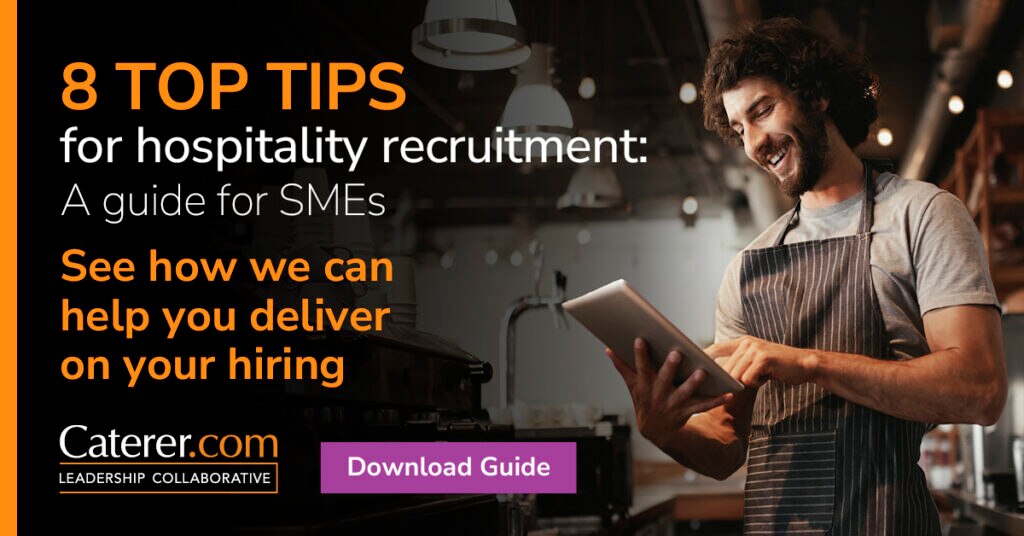8 top tips for SME’s hospitality recruitment
How can small and medium sized business hire the talent they need to survive and thrive? The challenges are real, the talent is out there, but how do you find them, and better still, hire them to become part of your business success? Caterer.com took a deep dive into something we know a lot about – helping SME’s finds and recruit top people and how to maximise the benefits that working for you offers. We want to make your business stand out from your competitors in a crowded marketplace – how? By a set of actionable tips and key strategies that will help you attract, hire, and retain top talent in the fiercely competitive hospitality sector.

Plan ahead
It sounds easy but most owner/managers of SME’s are constantly dealing with day to day operations, with very little time for forward planning. Carving out some time for planning is something that happens after a busy shift and possibly not as high on the ‘to do’ list as it should be. Businesses that plan ahead, have a long-term vision and communicate this to their teams, are better prepared for when the busy times come along and have greater staff retention too.
Elevate your employer brand
Jobseekers have unlimited access to information about your business, and it influences their decisions when it comes to recruitment. How do you stand out from the crowd and what steps can you take to be ‘the employer of choice’? Ask yourself, ‘Is my business a great place to work? Does our website share positive stories? Are we unique and will our values and culture resonate with potential hires? Investing time in your brand, and how you communicate it to talent, will make you an attractive, stand out option when you’re looking for new hires.
Have a flexible recruitment strategy
Don’t stick rigidly to the job spec when recruiting. You might miss out on some fantastic talent if you do. Put skills and experience before job requirements – you can work out what training and development your new hire needs and put those in place after onboarding. Use data about your business to guide you when recruiting – ask yourself are we recruiting in the right places, what is the age profile of our teams, is our application process losing us candidates, what is our data telling us and how can we flex our strategy to reach our target hires?
Is your job ad losing you potential hires?
How do you convert interest into an application? Be clear and engaging in what’s on offer. Highlight career growth and why your vacancy offers more than just a pay cheque. Career development is increasingly important and the opportunity to progress within your business is attractive to candidates – show that you are invested in your new recruit’s future. Are your job ads relevant and could they contain unconscious bias – how are they worded and are the graphics representative of today’s workplace, and remember to focus on diversity, equity and inclusion. Your ads could be losing you candidates. A diverse workforce is a more dynamic workforce with fresh ideas and innovations.
Look past the qualifications and experience
Two-thirds of people aged 16 – 24 would consider a career in hospitality and employers need to look past the lack of qualifications and experience to see the full potential of these young people. Cultural fit and soft skills can be far more beneficial to your business than a raft of qualifications. Don’t overlook the value of attitude, personality and character and how they’ll fit and perform in your existing team. How candidates handle tricky situations can tell you more than any CV and how they react to complaints and adapt to change can add real value to your team.
Check for Red Flags
Sometimes a great application doesn’t result in a great recruit. Things to look out for include enthusiasm – does the candidate demonstrate a real passion for the role. A candidate who is indifferent could just be looking for another job and not a career with your brand. Work ethic is another potential red flag – how the candidate responds to tough situations and busy shifts matters and the ideal candidate shows an enthusiasm for flexible shifts and peak periods. Interviews are a two-way conversation so look out for candidates who are engaged with the process, ask insightful questions and demonstrate a genuine interest in your vacancy.
Onboarding matters – and the research proves it
Only three in ten (29%) of hires feel prepared to excel in their news roles post onboarding. So, what should you be doing to ensure that your new start gets the very best experience from minute one on day one? A structured onboarding plan is a great starter for ten and should include everything from training opportunities, an introduction to your culture, detailed info about your business and a breakdown of what’s expected from them in their role, broken down by day, week, month etc. showing development milestones. Providing a mentor/buddy is a great way to calm the new job jitters and regular check ins that offer continuous support is shown to help with retention in those first few critical weeks.
Recruitment is costly so avoid mistakes
Hiring someone who looked great on paper, had all the necessary skills and interviewed like a rock star could be a costly mistake. Why? Because they might not have what it takes to deliver the level of customer experience your guests expect. The wrong hire could affect your brand and the reputation you’ve build. Don’t ignore that ‘gut feeling’, as a lack of cultural fit can damage your business and create friction and discord within your existing team. The cost of recruitment can be as much as 25% of an employee’s annual wage so every hire has to be right on every level.
To learn more, read Caterer.com’s latest guide for SMEs: 8 Top Tips for hospitality recruitment.